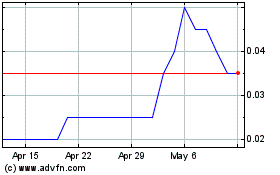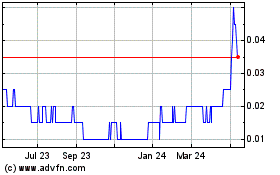All 2009 Till Results for Credit Lake Received-Compelling Geochemical Responses Cause Geophysical Targets to Be Upgraded to Very
March 03 2010 - 8:30AM
Marketwired Canada
Arctic Star Diamond Corp. ("Arctic" or the "Company") (TSX VENTURE:ADD) is
pleased to report that it received all of the 2009 till geochemical results at
Credit Lake. This program was designed to, and succeeded in, discovering new
targets that may be due to blind (buried) mineralization along the strike of the
Providence Greenstone Belt. This belt contains the magmatic, komatiite-hosted
nickel-copper-cobalt and platinum group element (Ni-Cu-Co-PGE) sulphide
discovery made by Arctic in 2008 which was also selected on the basis of an EM
(Electro-Magnetic) target that was coincident with a high nickel-in-soil
geochemical anomaly. Arctic's best drill hole in the discovery area reported
5.1m @ 1.73%Ni, 1.75% Cu, 0.17% Co and greater than 2g/t platinum equivalent
(Pt+Pd+Rh+Ir+Os).
The final compilation of these geochemical data clearly indicates, enhances and
defines eight high priority nickel+copper+cobalt targets in the Central and
Western Zones in addition to the eleven targets identified in the Eastern Zone,
which were discussed in our new release of February 8, 2010. Most of the eight
priority zones coincide well with geophysical targets that were developed from
the 2008 VTEM airborne survey. Numerous of these soil anomalies possess
signatures of magnitudes equal to or greater than that signature developed from
detailed soil sampling over the discovery area.
To view the Figure associated with this press release, please visit the
following link: http://media3.marketwire.com/docs/soiltargets.pdf
The grey scale image in the background is a gradient map of the total magnetic
field. The arcing east-west trending bands map the ultramafic rock types that
host the nickel mineralization at the 2008 discovery site. The north-northwest
striking features are young diabase dykes that intruded the Providence Belt much
later than the mineralizing events.
The VTEM response (channel 23) is shown in color: The "hotter" the color, the
"stronger" the electromagnetic response. Anywhere that the VTEM response and the
magnetic response coincide, is considered an excellent drill target. There are
45 separate areas and zones where this occurs.
The nickel, plus copper, plus cobalt geochemical response from the till sampling
for which the results are being reported here are superimposed on the image as
50ppm contours. The more anomalous areas are represented by dense compact lines
on the image. Red arrows have been placed where there is a strong correlation
between the geochem and a nickel EM signature; the yellow arrows represent areas
where ground EM investigation is warranted.
Buddy Doyle VP Exploration for Arctic said, "These new results continue to
reinforce the notion that both this type of sampling method is effective in the
Arctic and that the Providence Belt has potential for additional new
discoveries. The proof will be in the drilling and I am pleased to say that we
are beginning mobilization for the spring, 2010 program by ordering the fuel
needed to be hauled up the winter road. We expect drilling to begin on or about
April 1st."
Table 1 summarizes some of the characteristics of the VTEM targets where they
coincide with till geochem anomalies in the Central and Western Zones.
----------------------------------------------------------------------------
EM Geochem VTEM Ground EM & Comments
Target Mag
Name
----------------------------------------------------------------------------
TZ-21 On south side of Good airborne Confirms the TZ-21 and the
strongest geochem- response on presence of coincident soil
soils anomaly north flank of EM and mag anomaly is well
ultramafic trend target at placed on north
in Central Zone TZ-21. flank of
ultramafic trend
and at major
structural
intersection
with N-NW
diabase dikes
----------------------------------------------------------------------------
A15 A subtle geochem No explanation To be Needs ground
response in an at surface, completed surveying before
area of thick thick cover. prior to drilling
glacial cover Moderate EM drilling
(boulder pavement response
equals poor sample
conditions) This
response suggests
the anomaly would
be more intense if
good sample medium
were present
----------------------------------------------------------------------------
TZ-5 Weaker soils Moderate-weak Needs ground No surface
response but poor airborne surveying explanation of
sample conditions. response before drill conductor, sand
Talus slope at isolated on testing & large boulders
foot of steep north side of in talus slope
cliff formational
conductor
----------------------------------------------------------------------------
A-20 Multiple moderate- Moderate Good EM and Within and on
& 21 weakly anomalous magnetic and EM mag responses north flank of
Ni, Cu, Co soil responses ultramafic
responses trend
coincident with
geophysics
----------------------------------------------------------------------------
The Qualified person for this news release as per the guidelines of NI 43-101 is
Buddy Doyle.
Statements Regarding Forward-Looking Information: Some statements contained in
this news release are forward-looking statements. Investors are cautioned that
forward-looking statements are inherently uncertain and involve risks and
uncertainties that could cause actual results to differ materially. There can be
no assurances that future developments affecting Arctic will be those
anticipated by management.
Arctic Star Exploration (TSXV:ADD)
Historical Stock Chart
From Dec 2024 to Jan 2025

Arctic Star Exploration (TSXV:ADD)
Historical Stock Chart
From Jan 2024 to Jan 2025
